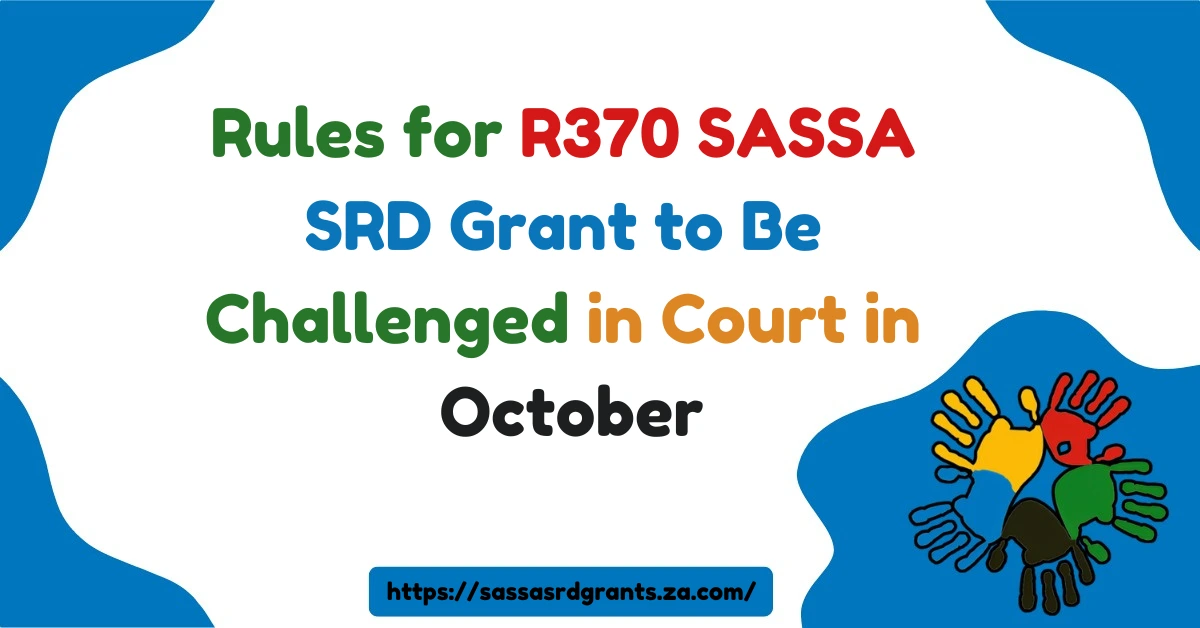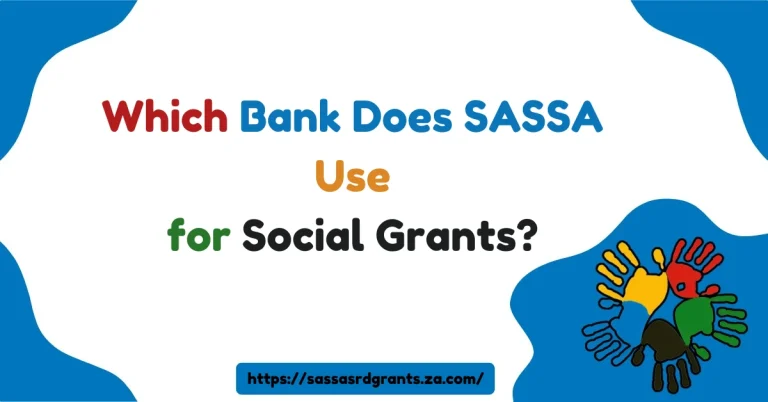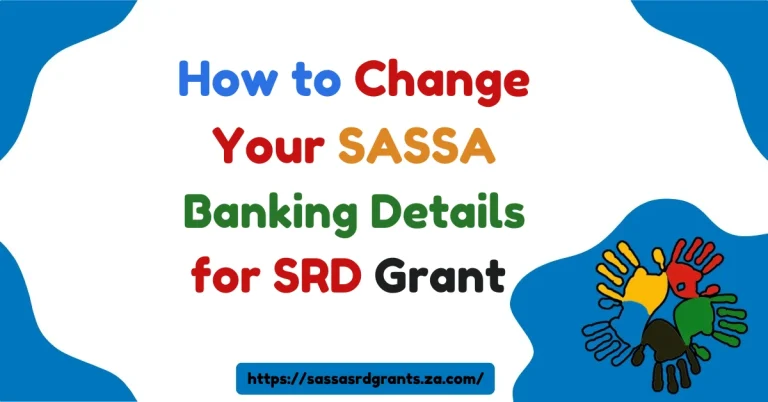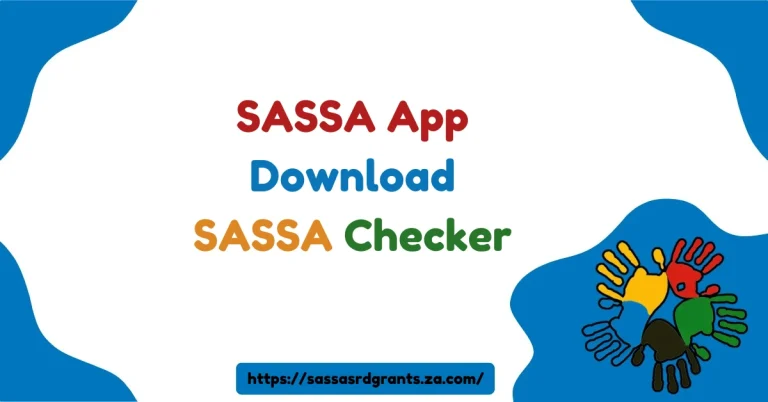Rules for R370 SASSA SRD Grant to Be Challenged in Court in October
In October, the highly anticipated legal challenge to the R370 SASSA SRD grant is set to take place, and the outcome could have profound implications for millions of South Africans who rely on this vital financial support.
For those navigating unemployment and poverty, this grant has been a much-needed lifeline. However, critics argue that the strict eligibility criteria attached to the grant have left too many people excluded from the assistance they desperately need.
As we approach this court case, let’s explore the history of the SRD grant, why its rules are being challenged, and what this could mean for social welfare in South Africa.
Rules for R370 SASSA SRD Grant to Be Challenged in Court in October(Quick Answer)
The R370 SASSA SRD Grant rules will face a court challenge in October, led by civil society groups arguing the grant amount is insufficient. They claim the current amount violates basic human rights due to the high cost of living. If the court rules in favor of increasing the grant, it could lead to higher financial support for vulnerable individuals. Beneficiaries will continue receiving payments during the legal process.
Understanding the SRD Grant: A Lifeline Born from Crisis
The Social Relief of Distress (SRD) grant was initially introduced as a temporary measure during the COVID-19 pandemic to provide financial support to those without any source of income.
When the economy took a hit, many South Africans found themselves unable to earn a living, and the government responded by creating the SRD grant, originally set at R350 per month.
Since its introduction, the amount has increased to R370 per month, and although it was meant to be a short-term solution, it remains crucial for many who are still facing severe economic hardships.
Over time, the SRD grant has evolved from a temporary relief mechanism to a cornerstone of survival for millions of South Africans.
The ongoing financial struggles, despite the pandemic’s decline, have kept many reliant on this grant, underscoring its significance.
The Legal Challenge: Why the SRD Grant Rules Are Being Contested
In October, civil society groups and advocacy organizations will take the current rules governing the R370 SASSA SRD grant to court. These groups argue that the eligibility criteria are far too restrictive and unfairly prevent many deserving individuals from receiving the grant.
The crux of the argument lies in the belief that the eligibility rules—which require applicants to have no other income, even if it’s minimal—are too rigid.
This means that even people with tiny earnings but who still cannot make ends meet are excluded from receiving financial support.
The rules don’t take into account that many people earning small amounts are still in dire need of assistance due to South Africa’s high cost of living and widespread poverty.
Key Concerns: Why Are People Upset with the Current Rules?
There are several concerns raised by those who are challenging the SRD grant rules. These issues are at the heart of the upcoming legal battle:
Restrictive Eligibility Criteria
The current rules are seen as overly restrictive. To qualify for the grant, applicants must prove that they have no income whatsoever, not even a small amount.
This narrow definition of need excludes a large group of people who may have minimal earnings but are still struggling to survive in the current economic climate.
Insufficient Financial Support
While the R370 per month grant is undoubtedly helpful, many critics argue that it’s simply not enough to cover basic living expenses. Given the rising costs of food, housing, and other necessities, R370 is often inadequate to provide meaningful relief.
Advocates are pushing for an increase in the grant amount, arguing that the government needs to do more to address the realities of poverty in South Africa.
Difficult Application Process
The application process for the SRD grant has also come under fire. Many people find the online system challenging to navigate, and the requirement for specific documents creates barriers for those without easy access to the necessary paperwork.
As a result, many who are eligible for the grant don’t end up receiving it due to administrative hurdles.
What Could Happen if the Court Rules in Favor of the Challengers?
If the court sides with the advocacy groups challenging the SASSA grant rules, the outcome could lead to sweeping changes in how the SRD grant is distributed. Some potential outcomes of a favorable ruling include:
- Broader Eligibility: The eligibility criteria could be revised, allowing more people to qualify for the SRD grant. This would help expand the safety net for vulnerable individuals who are currently excluded.
- Increased Grant Amount: There is also a possibility that the court could push the government to raise the grant amount. With many people calling for an increase to better reflect the true cost of living, a favorable ruling could lead to a higher monthly payment for those relying on the SRD grant.
- Simplified Application Process: In addition to changing the eligibility rules, the court could order a simplification of the application process. This could make it easier for people to apply for and receive the financial assistance they need.
A ruling in favor of the challengers could set a significant legal precedent for how social welfare programs are managed in South Africa, potentially reshaping the landscape of poverty relief.
What Happens if the Court Rules Against the Challenge?
On the other hand, if the court sides with the government, the current eligibility rules will remain in place. This could mean that many people who are currently excluded from the SRD grant will continue to be left out.
However, such a ruling is unlikely to end the debate. The ongoing public dissatisfaction with the rules could lead to further legal challenges or even policy changes down the road.
The Government’s Defense
The South African government has defended the current rules, arguing that the strict eligibility criteria are necessary to ensure that the SRD grant is distributed fairly.
The government’s main concern is that without strict rules, there could be fraud and misuse of the funds meant to support the most vulnerable.
They also argue that the administrative challenges are being addressed, although public frustration with the application process remains high.
Why This Court Case Matters for South Africans
The outcome of this court case will have far-reaching consequences for millions of South Africans. For those who rely on the R370 SASSA SRD grant, the stakes couldn’t be higher. A favorable ruling could bring about much-needed changes, making the grant more accessible and perhaps even increasing the amount provided.
At the same time, this case has sparked broader conversations about the role of the government in providing social support to its citizens.
With poverty and unemployment still major issues in South Africa, many people believe that the government needs to do more to support those who are struggling to survive.
FAQs: R370 SASSA SRD Grant Court Challenge
1. What is the SASSA SRD Grant?
The SASSA SRD Grant is a Social Relief of Distress (SRD) grant provided by the South African government through the South African Social Security Agency (SASSA).
It was introduced during the COVID-19 pandemic to provide temporary financial support to unemployed individuals or those without other forms of social assistance.
2. Why is the R370 amount being challenged in court?
The R370 amount for the SRD grant is being challenged because advocacy groups and beneficiaries believe it is insufficient to cover the basic needs of vulnerable individuals.
They argue that the grant should be increased and that the current amount does not align with the rising cost of living.
3. Who is leading the court challenge?
The legal challenge is being spearheaded by civil society organizations, human rights groups, and social justice advocates who argue that the current amount of the SRD grant violates basic human rights and dignity.
4. When will the court challenge take place?
The court case challenging the rules for the R370 SASSA SRD grant is scheduled to be heard in October 2024.
5. What are the main arguments of the court case?
The primary arguments revolve around the inadequacy of the R370 grant in meeting the essential needs of the recipients.
Advocacy groups argue that the amount should be increased to a livable level that reflects inflation and economic hardship faced by unemployed individuals.
6. What could happen if the court rules in favor of increasing the SRD grant?
If the court rules in favor of the challenge, it could result in an increase in the SRD grant amount.
This would provide more financial relief to the most vulnerable individuals in South Africa, though it could also lead to budgetary adjustments by the government.
7. Has the SRD grant amount been changed before?
Yes, the SRD grant amount has been adjusted multiple times since its introduction during the pandemic, but advocates argue that the current R370 still falls short of what is needed for basic living expenses.
8. How does one qualify for the SASSA SRD grant?
To qualify for the SASSA SRD grant, an applicant must be unemployed, between the ages of 18 and 59, not receiving any other form of income or social grants, and be a South African citizen or permanent resident.
9. Will the court challenge delay current SRD grant payments?
As of now, the legal challenge is not expected to delay current SRD grant payments. Beneficiaries will continue receiving the grant while the court proceedings are underway.
10. Where can I get updates on the court case?
You can follow updates on the court case through official news outlets, government websites, or advocacy group platforms that are involved in the challenge.
Conclusion
As we await the court’s decision, the future of the SRD grant hangs in the balance. Regardless of the outcome, this case is sure to have lasting effects on how social welfare programs are designed and implemented in South Africa.
For the millions of people who rely on this vital financial support, the court’s ruling could be a turning point in their fight for economic survival.






